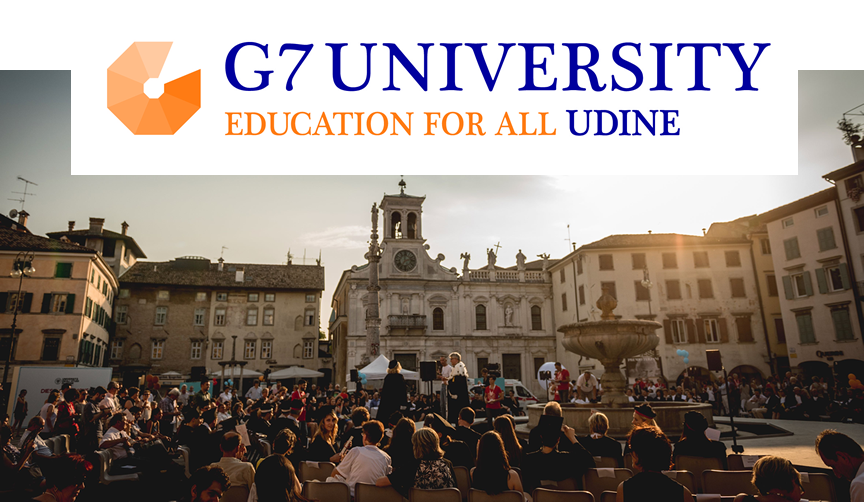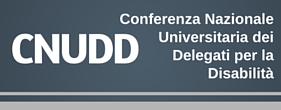G7 UNIVERSITY
- Published in CRUI NEWS
- font size decrease font size increase font size

University Education for All. Actions for a sustainable future
G7 University - Udine, 29th and 30th June 2017
Manifesto di Udine - G7 Università* | The Udine G7 University Manifesto*
*Versione preliminare 30-6-2017 | Preliminary Draft 30-6-2017
In the forthcoming decades the need for higher education all around the world will necessarily grow alongside the world's population. It is estimated that the number of students, now settled at around one hundred million, will be roughly quadrupled by the year 2030. These developments challenge deeply all the citizens and governments of the planet and certainly those who, for various reasons, are involved in higher education design and delivery.
In this regard, we strongly think that a political message that is supposed to enlighten the future should be: Education and, above all, University Education for All (UE4A). And by this we mean Higher Education that is: broadly and proactively inclusive; of good quality; geographically distributed; respectful of difference (gender, age, culture, religion and civil beliefs). In order to achieve such an ambitious goal, it is of utmost importance that the academic world tackle it soon and as effectively as it can.
In 2017, it is Italy’s turn to preside and host the G7 meeting between the Heads of State. Along with it, our Country will host a whole array of G7 meetings, among which the G7 University, to be held in Udine on June 29th-30th. “University Education for All. Actions for a sustainable future” will be the pivot topic around which the whole event will revolve. And so as not to surrender to wishful thinking or empty declarations of intent, we aim to elaborate on the matter by articulating the debate into four round tables tackling, each, a different topic: Education and Sustainability; Global Citizenship; University, Culture and Society; University and Economic Development. This four pillars mark the boundaries of the tough task that is awaiting us around the corner.
THE ROLE OF HIGHER EDUCATION TO FOSTER SUSTAINABLE DEVELOPMENT
Practices, tools and solutions The Education for Sustainable Development (ESD), namely higher education (HE), has a pivotal role both in the achievement of sustainable development goals and in the Post-2015 Agenda’s implementation (UNESCO, 2012, 2014).
Academia has always been the cradle of innovation, theoretical debates and practical experimentation but it has also the mission of discerning truth, imparting knowledge, skills and values and preparing responsible citizens and competent workers who will contribute to an improving world. Recently colleges, universities and networks of different kind (e.g. SDSN) have developed educational initiatives which represent a wealth of sources of innovation in sustainability. In this framework courses, master classes, MOOCs (Massive Online Open Courses), etc. are burgeoning and we are assisting to a shift from purely theoretical perspective to a more “in practice” or solution-oriented approach.
This round table will tackle the inclusion of sustainability in HE curricula and classrooms by drawing from recent literature and from a large selection of case studies and best practices at global level. In particular, methodologies, tools and learning processes will be discussed in order to highlight strengths and weaknesses of the ongoing initiatives taken into consideration.
The introduction of sustainability in HE requires innovations at several levels: first of all, new collaborations between hard and soft sciences are needed, then the employment of the ICT in the learning process is more and more central to foster an open science approach and to improve accessibility to knowledge resources and skills for a wider audience.
In this context the experience of MOOCs will be investigated more closely since the e-learning opportunities are considered fundamental as in the “Roadmap for implementing the global action programme on education for sustainable development” (UNESCO 2014). The round table will take advantage of a benchmark analysis of several MOOCs (in collaboration with SDSN) which will consider both the methodological aspects (topics, technology, etc.) and the social aspects (users’ profile, geographical catchment area, etc.) to identify undiscovered issues and problematic elements (e.g. technological barriers, thematic gaps. etc.).
The outcomes of the round table will hopefully contribute to suggesting future scenarios for the improvement of sustainability in HE and for the educational transformation that is required to create a sustainable future.
GLOBAL CITIZENSHIP: THE CRUCIAL CONTRIBUTION OF HIGHER EDUCATION
What is global citizenship? Is global citizenship (GC) a “citizenship”? The answer can be affirmative on condition that we consider “citizenship” as a historically evolving notion. In the 19th and 20th centuries, “citizenship” was part of the conceptual constellation “law-sovereignty-nation”. GC sees the persistence of the three dimensions: the legal, the political, and the cultural; but changes occur in each of them. In the legal order, GC relates to the international rather than to the internal law. In the political dimension, GC depends no longer on sovereignty but on influence. In the cultural dimension, the emotional emphasis is less on nation and identity and more on humanity as a whole, and on diversity.
Education and global citizenship. Education at any level played a crucial role in state and nation building and therefore in shaping the state-centred concept of “citizenship”. The same is – and arguably will be – true with reference to GC. Many agents work to this effect. Their main goals are three. First, to spread the awareness of a new bundle of rights, legitimate interest, duties and obligations that appertain to the globalized individual (legal GC). Second, to increase the degree of knowledge of and participation in the multifaceted, articulated, highly dynamic governance of the planet, with individuals and groups taking action at local as well as at global level (political GC). Third, to develop a feeling of sympathy with the ‘others’, and of belonging to the large human family along with full respect and appreciation of cultural and individual diversity (cultural GC).
The role of higher education. Higher education can strongly support these developments. Firstly, we should bear in mind that universities were born before the nation-states. They are essentially cosmopolitan entities and therefore apt to play the function of GC builders. HE institutions can also tackle obstacles to GC in addressing international tensions, dispelling prejudices etc. Add that HE and research institutions are responsible for a good deal of the impressive intellectual migrations we are witnessing. Furthermore, they produce future leaders, a critical factor for the ongoing globalisation process. In sum, HE institutions can effectively help GC become more than a rhetoric notion.
HIGHER EDUCATION AND THE CHALLENGE OF SOCIAL MOBILITY AND BETTER DEMOCRACY
Higher education can be a powerful driver both for improving the quality of democratic life as well to ensure social mobility.
Regarding the role of HE in reinforcing democracy, it has to be underlined that along with the global spread of democratic ideas and societies, a crisis of commitment to and practice of democracy persists. Democracy cannot exist without strong institutions and sound legislation, but it also cannot work without being based on democratic culture. Education and schooling are decisive forces shaping the democratic development of societies; and universities, in turn, are strategic institutions for the democratic development of schooling and societies. A democratic culture encompasses democratic values, ways of knowing and acting, ethical judgments, analytical competencies, and skills of engagement. It includes concern for the sustainable wellbeing of fellow human beings as well as of the environment in which we live. It includes awareness of and concern for human rights as well as openness to the cultural diversity of human experience and willingness to give due consideration to the views of others.
On the other hand, we perfectly know that societies need to ensure a proper level of social mobility and that HE can be a real driver for it and thus a powerful instrument to re-establish more social equality through which the socio-economic imbalance that dis-advantage those students belonging to low-income family could be addressed and amended.
The round table will tackle both the roles that HE can play to improve the quality of human societies and will propose some recommendations for future policy interventions.
HIGHER EDUCATION AND SOCIAL ECONOMIC DEVELOPMENT
Despite the fact that more equal access to higher education has been an objective public policy for several decades, little is known about the effectiveness of alternative means for achieving such goal. Indeed, nowadays high level of graduate population can be observed both in countries with high and low level of fees, or high and low level of public expenditure in higher education.
This round table will start from the economic background concepts of markets, demand, and supply, and review key determinants of demand and supply. Debate will take advantage of a theoretical model of aggregate demand and supply of higher education, with the aim to facilitate the understanding of the challenges of today’s higher education systems, as well as the opportunities for development. The model will be validated on some exemplary case studies describing different relationship between the level of public investment and levels of graduate population.






